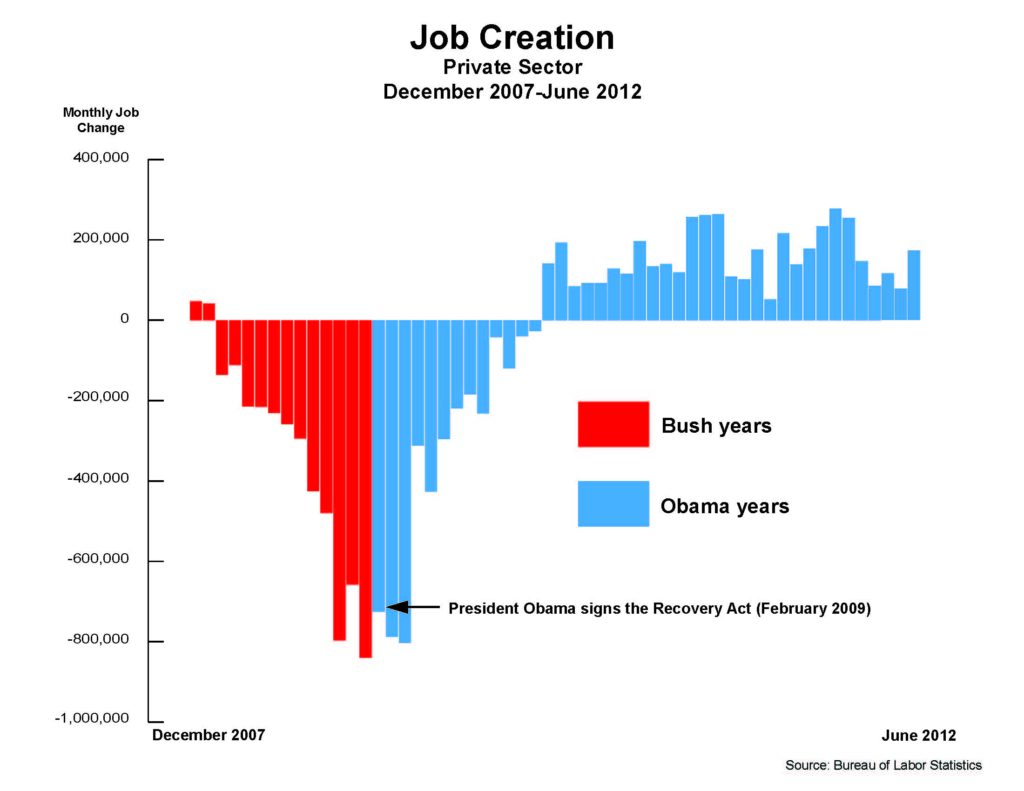Nearly four years ago, President George W. Bush left behind the worst economic wreckage since the Great Depression of the 1930s. The country was bleeding 700,000 jobs a month when President Barack Obama took the oath of office in January 2009.
Economic gloom, insecurity and stark fear gripped the United States, as policymakers and ordinary Americans saw the specter of Great Depression 2.
Today, with a stubborn unemployment rate of 8.3 percent, the recovery is the slowest since World War 2, but the Great Recession is officially over. The economy, though still lackluster, appears on the mend with 163,000 jobs created in July, consumer confidence growing and manufacturing picking up.
“Our economy still needs to make up for job losses in the Great Recession and create more jobs to keep up with the growth of the labor force,” said Lisa Lindsley, director of Capital Strategies at the American Federation of State, County and Municipal Employees. “But the economy and unemployment would be much worse if the administration hadn’t pursued the stimulus.”
Obama pledges to build upon the successes of his first term. If re-elected, he aims to address the country’s inequality by making the wealthy pay their fair share and strengthening the economy with a new stimulus and greater support to the public sector.
Obama’s $787 billion stimulus put a stop to the job hemorrhaging and economic contraction. A larger stimulus would have meant a stronger recovery, but deficit hysteria and Republican obstructionism tied Obama’s hands. Overall, the independent Congressional Budget Office estimates that the stimulus created 3.3 million jobs.
“The stimulus was a success,” Rebecca Thiess, a policy analyst at the Economic Policy Institute in Washington said. “There is no question it led to economic growth, and unemployment would probably be 1½ to 2 percent higher without it.”
For the public sector, the stimulus provided billions of dollars that helped state and local governments make up for falling revenue and employees.
The severe downsizing in the public sector — 600,000 jobs lost since June 2009 — didn’t occur until the stimulus money was used up and Republicans in Congress sabotaged Obama’s plan for a second stimulus.
Obama’s American Jobs Act would devote $450 billion to help the unemployed get back to work, assist small businesses, prevent 280,000 school layoffs, invest in infrastructure and transportation, and modernize more than 35,000 schools.
But while Obama is running on a platform of activist government, the policies of Republican candidate Mitt Romney and his running mate, Congress member Paul Ryan, would put the country on a path to economic shrinkage and mass layoffs.
Ryan’s 2012 budget plan — embraced by Romney and touted by Republicans as the blueprint for their vision of government — calls for privatizing Medicare, handing the wealthy huge tax breaks, and slashing Medicaid, food stamps, Pell college grants and low-income housing. “I’m very supportive of the Ryan budget plan,” Romney said recently at a campaign event in Chicago.
The Economic Policy Institute estimates that the Ryan budget “would lead to a large and immediate job loss,” Thiess said, killing 1.3 million jobs in 2013 and 2.8 million in 2014.
The 2012 presidential election is turning out to be a grand debate about the role of government. The contrast between the philosophies of the candidates is clear in how they view the 2009 auto industry bailout.
On the campaign trail, Obama points out that General Motors is again the world’s largest automaker and enjoys record profits. Thanks to the bailout, auto firms and their suppliers have created 200,000 new jobs (though their unions now have two-tiered pay scales).
Catering to the anti-government Tea Party wing of the Republican Party, Romney demonstrated his “free-market” mentality earlier this year when he called the auto rescue “crony capitalism on a grand scale.” It seems Romney, former CEO of the job-killing Bain Capital private-equity firm, would have been content to allow the auto industry to die.
“President Obama and Vice President Biden are fighting for everyone to have a fair shot at the American Dream,” AFSCME President Lee Saunders said, after Romney announced his choice for vice president in August. Mitt Romney and Paul Ryan are plotting a nightmare for middle-class families.”
This is a revised version of an article that originally appeared in the September 2012 edition of Public Employee Press, the official publication of DC 37, AFSCME (AFL-CIO), representing 120,000 public employees in the City of New York.


